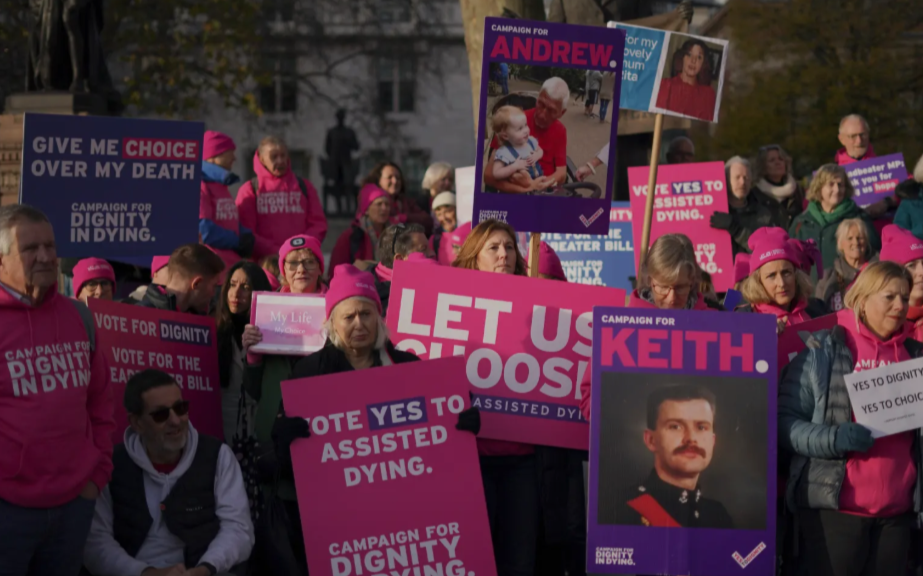PRESSURE POINT – Three cheers for parliament?
by Joseph Rodgers | December 5, 2024

Discussion following the Commons’ vote last week on assisted dying has, understandably, continued to be oppositional. Kim Leadbeater’s bill still has a way to go before it becomes law, so the debate continues over whether we should legalise voluntary euthanasia, and, if so, whether the Terminally Ill Adults bill is the right way to do it. But a certain amount of agreement seems to have arisen in relation to one particular thought: Parliament did a bloody good job.
In the run up to the vote, there had been dissent about how long MPs were being offered to consider the Bill. Since it was a Private Members Bill—of which there are quite a few that all need to be squeezed into the relatively small windows allotted to proposals which aren’t from government ministers—debate time was limited. And looking back now, the worries make a lot of sense. The Bill was put to the House first thing on Friday morning, but by 2:30pm, MPs had said all they were allowed to on the matter, and it was time to vote. After counting was finished, we learnt that the ayes had it (the ayes had it), and the Speaker moved swiftly on to the all-important Ferrets Bill. Compare this to the Wednesday prior. By the same time, MPs had witnessed an unremarkably unproductive PMQs, discussed the closure of a van-making factory in Luton, and gone over some familiar territory about the Government’s efforts to deal with anti-social behaviour. Not to worry, though, the big stuff was on its way: at 2:30pm on the dot, Jessica Morden moved to bring a bill requiring a public review into the legislation and guidance on e-scooters. I don’t want to seem overly dismissive of these matters. Legislatures need to deal with all issues, and unemployment in Luton, for example, is nothing to be scoffed at. But taken side by side, Wednesday’s business pales in comparison.
For all that, however, MPs were pretty pleased with themselves. Enforced brevity did not seem to have affected members’ views about the quality of the debate. Kieran Mullan, given the last word against the Bill, concluded that the debate “represents the house at its very best”, while Alex Davies-Jones, who spoke last of all, ended with the thought that the weeks leading up to that moment had surely enabled a “powerful honesty [that] is a tribute to how Members of this house and campaigners have conducted themselves throughout”. Much as it would be nice to concur with all this, I have to say that I don’t.
First take attendance. It is quite striking, if you watch back video of the debate, how packed the chamber was. You expect to see a fair amount of that unmistakable shade of green when (if) you tune into BBC Parliament, but, so packed were the benches, there’s barely any to be seen in Friday’s footage. So, Alice Kearns argued against worrying about the speed at which the debate passed: “We have to be honest with ourselves, this bill has been read far more vociferously than most bills that come before this House.” But outdoing the lax standards of Parliament is not enough to stop me worrying about the timings. Just because most bills are read out to largely empty rows, it doesn’t mean that the full house justified the hastiness. Consider for yourself: how long have you spent working through the arguments about assisted dying? How made up is your mind on it? My guess is, for most, there’s been a lot of thinking, and not much certainty reached. And Parliament got through it all in five hours! It might be argued that MPs had time plenty of time think beforehand. Given the radio silence from hundreds of MPs on which way they would go, though, I don’t buy that much. To give constituents less than a day’s signal between the Bill never having been debated and the Bill being passed is, frankly, not good enough.
There has also been plenty of self-congratulation about the volume of MPs who opened up during the debate about the personal experiences that influenced their view. Far be it from anyone to begrudge someone for whom the death of a loved one has altered, in either direction, their opinions on the matter. But I do worry what it says about representational democracy. The point of MPs is that they reason through their stances based on what is best for their constituents. If it feels instead like the outcome of such a significant national question is really the result of an arbitrary process through which the personal experiences 650 MPs, who do not mirror the demographic character of the country as a whole, determines the outcome of laws for us all, then we might feel we were better of having a referendum. That way all of our personal experiences can come into the equation. But nobody particularly seems to want a referendum on this issue (and I can see why), so MPs would have been better off, as callous as this sounds, sticking to arguments that mean something to us all. There was a lot of controversy in the run-up over the possibility that some MP’s religious convictions would sway their votes, but I find it hard to see how what we got was any less partial.
Many have also been struck by the way this issue criss-crosses the ideological divisions we are used to seeing determine the debate. I agree that it’s interesting: there was divergence between McDonell and Corbyn, Starmer and Streeting, Sunak and Badenoch, Farage and Tice, and I could go on. But let’s not be mistaken: this Bill going through is a consequence of the Labour landslide. With a Tory majority, it wouldn’t have had a hope. (In 2016, a very similar bill was defeated by more than two votes to one.) And whether he likes it or not, assisted dying, if it gets through the remaining parliamentary stages, will be a key memory of Starmer’s time in power. The question is an ethically fraught one, so I can see why he gave the party a free vote on it, but that does not quell the association. Social progressivism and healthcare reform are key aspects of Starmerism, and this bill fits right in. Strangely though, we’ve heard almost nothing from the Labour leader. When it became clear that Leadbeater was going to bring assisted dying back on the table, all he had to say was that he was glad he could keep his promise to Esther Rantzen that he would be make time for a debate. As respectable Rantzen’s campaign has been, I can’t help but feel that he should have said something more.
I’m not going to offer my view on the Bill, because I’m a mere PPE student who isn’t even taking Practical Ethics. There are, all agree, strong arguments on both sides. But MPs have signed up to make tough decisions, and our PM has signed up to be this country’s figurehead. The Bill will go through the committee stage, before returning for a third reading in the Commons. It might seem all tied up from here, but it isn’t. Many MPs signalled that their support was only in principle, and that their final assent was dependent on sufficient scrutiny and revision. When we find ourselves returning to the issue, these MPs ought to keep to their word. However high they felt the standard of debate was, it should have been higher. However much Starmer might want to talk about something else, he should be talking about this.∎
Words by Joseph Rodgers. Image Courtesy of Free Malaysia Today.




